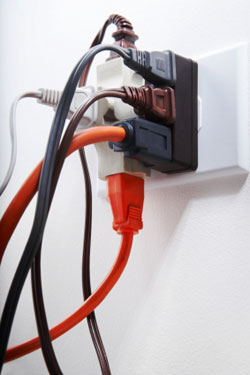Fire Extinguisher : 101
Understanding Electrical Fire Safety
| Home |
| About Fire Extinguishers |
| Using a Fire Extinguisher |
| Fire Prevention |
| Fire Hazards |
| First Aid for Fire |
| Financial Protection |
| Biggest Fires in History |
| Firefighters |
This site was voted:

by onlinefiresciencedegree.org
(scroll to 74 on the list)
This article is intended to provide individuals with general information pertaining to electrical fire safety warnngs and precautions. |
Each year in North America, hundreds of people die and thousands are injured in accidents involving electrical fires. Most of these incidents can be prevented by following simple electrical fire safety rules. Although some of these fires are caused by electrical system failures and appliance defects, many are caused by the misuse and poor maintenance of electrical appliances, incorrectly installed wiring, and overloaded circuits and extension cords. Statistics show that December is the most dangerous month for electrical fires. Not surprising, as people tend to stay indoors and increase lighting, heating, and appliance use during winter months.
Electrical
Wiring
 Most electrical fires result from problems with "fixed wiring",
such as faulty electrical outlets and old wiring. Many are caused by cords
and plugs, such as extension and appliance cords. In urban areas, faulty
wiring accounts for 33% of residential electrical fires. Misuse of electric
cords, overloading circuits, poor maintenance of cords, and running cords
under rags or in high traffic areas often lead to electrical fires that
could have been avoided.
Most electrical fires result from problems with "fixed wiring",
such as faulty electrical outlets and old wiring. Many are caused by cords
and plugs, such as extension and appliance cords. In urban areas, faulty
wiring accounts for 33% of residential electrical fires. Misuse of electric
cords, overloading circuits, poor maintenance of cords, and running cords
under rags or in high traffic areas often lead to electrical fires that
could have been avoided.
Home Appliances
Next to heating your home, appliances consume the most electricity and
sometimes cause electrical fires. Those most often involved are electric
stoves and ovens, dryers, central heating units, televisions, radios and
record players. Always follow the manufacturer's safety precautions when
using an appliance. Many people overlook seemingly-harmless warning signs
such as overheating, an unusual smell, short circuits, sparks and sputters.
If any of these occur, the appliance should be immediately turned off
and unplugged. Contact the manufacturer in order to determine what steps
to take next. However, if the appliance functions well, you may have encountered
an electrical wiring problem and should contact a certified electrician
to check the wiring in your home.
Some Safety Precautions
- Routinely check your electrical appliances and your home wiring
- Replace all old, worn out, or damaged appliance cords
- Use electrical extension cords wisely
- Keep clothes, curtains and other potentially combustible items away from all heaters
- Never overload extension cords or wall sockets
The most important fire precaution is to have a functioning smoke alarm in your home and to practice a home escape plan frequently with your family.
Fuses and
Circuit Breakers
When a fuse blows or a circuit breaker is tripped, find out what caused
it to overload before replacing or resetting it. Correct the problem and
if you cannot find the source or feel uneasy about the situation, do not
hesitate to call an electrician.
Electrical
Receptacle Outlets
Have a professional electrician replace old or damaged receptacles with
modern, three-wire, polarized receptacles. To minimize fire and shock
hazards, proper grounding is essential. Also, make sure that appliance
plugs match their receptacles. Never cut off or bend the ground pin of
a three-pronged plug as this ground connection protects you from shock
caused by a faulty cord or a malfunctioning appliance.
Warning Signs
Many electrical problems can be detected before they cause a fire or harm
someone. To better ensure electrical fire safety, learn to be alert and
pay attention to any irregular electrical function in your home. Some
warning signs include:
- A recurring problem with blowing fuses or tripping circuit breakers
- Experiencing a tingle when you touch an electrical appliance
- Discoloration of wall outlets
- A burning smell or unusual odor coming from an appliance or wiring
- Flickering lights
If you notice any of the above warning signs or if an appliance functions oddly, take appropriate measures to prevent an accident. Unplug the malfunctioning appliance immediately. If necessary, cut off power to the problem circuit by disconnecting the fuse or tripping the circuit breaker manually and locate the problem. When in doubt, contact an electrician or call the power company to inspect the electrical connections outside your home. Electrical fire safety is a serious matter and precaution is of utmost importance.
Written
by John Manley
Having experienced 2 house fires,
John Manley now devotes some of his spare time
educating people about the importance of having
fire extinguishers, CO and fire alarms, and
proper escape plans though the website: Fire
Extinguisher: 101 - www.fire-extinguisher101.com.